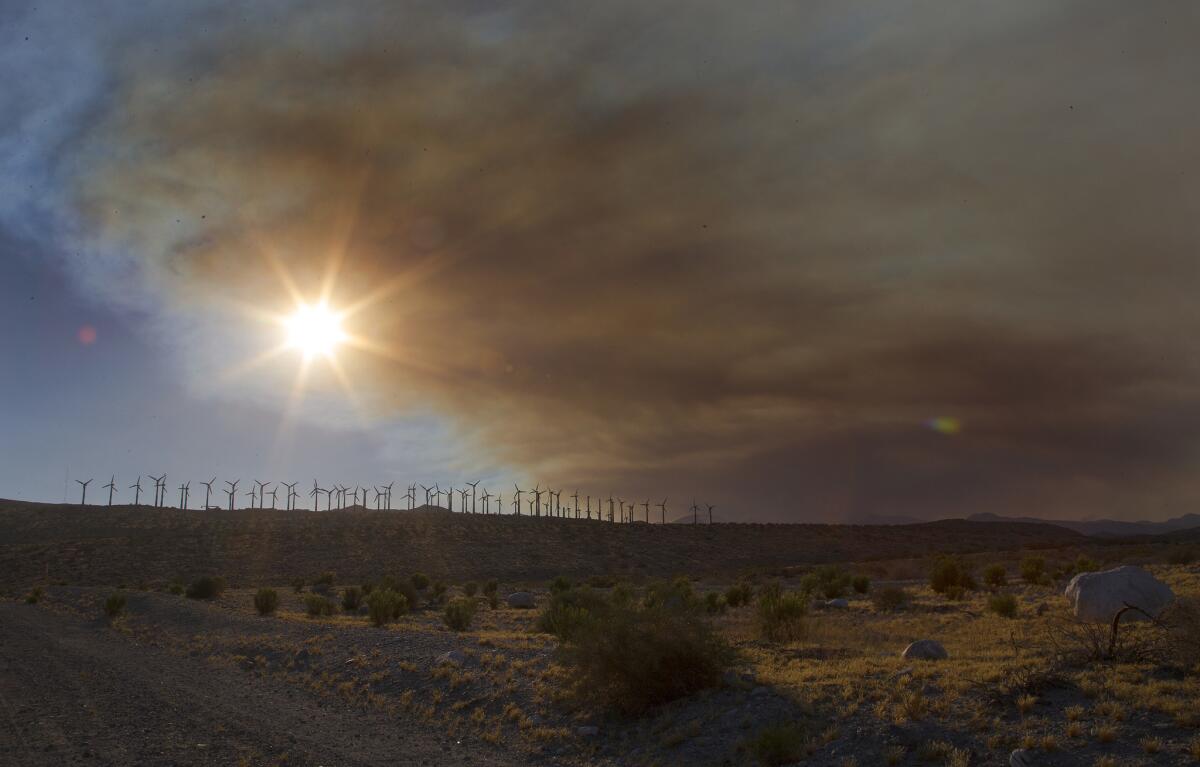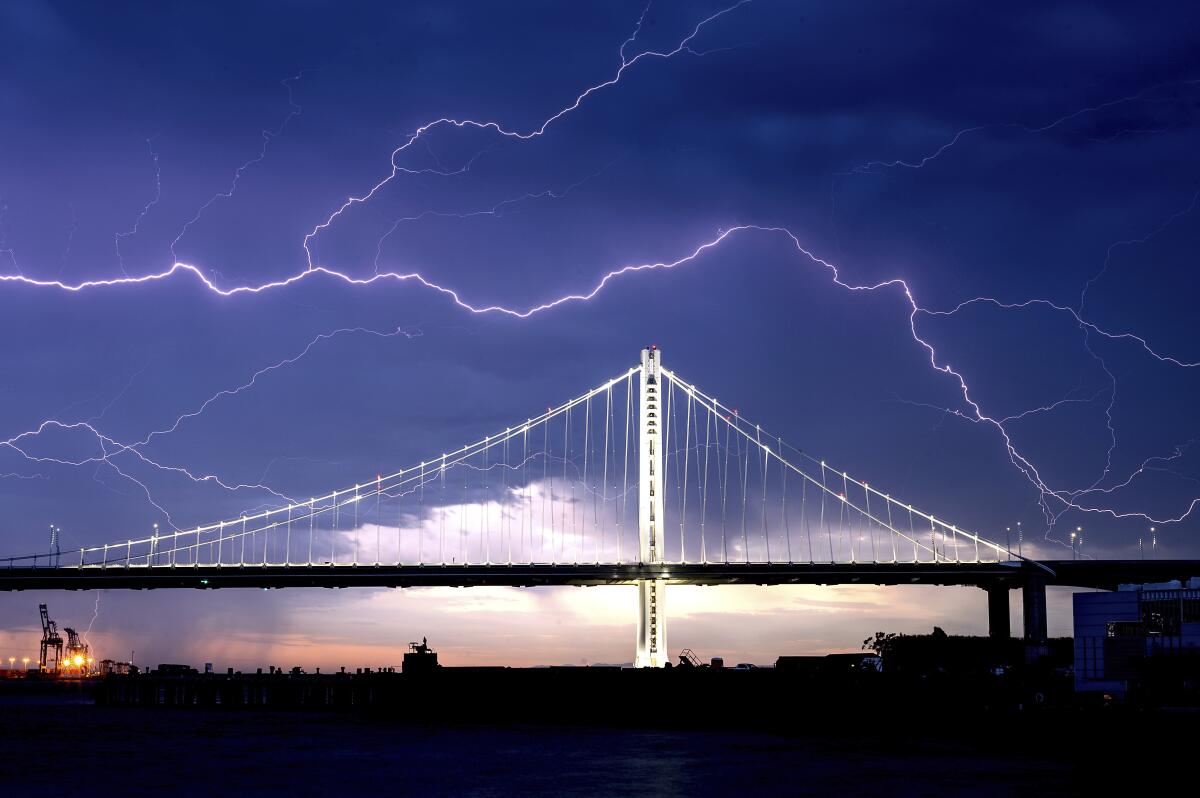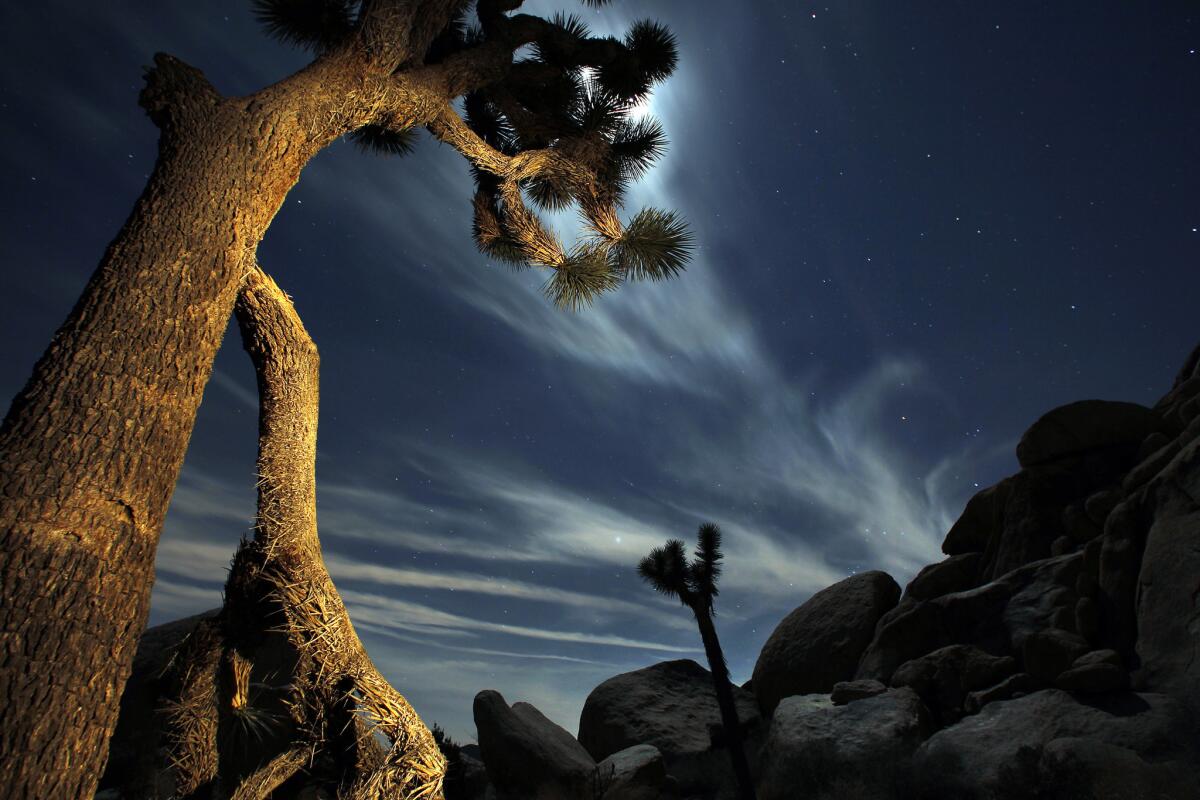California is broiling and burning. Here are ideas for dealing with climate despair

It’s hard to describe in newspaper-appropriate words how surreal life in California feels right now.
Wildfires are raging across the state, destroying Joshua trees and forcing Bay Area residents to breathe absolutely horrendous air. It’s so unbearably hot that state officials have twice shut off electricity to hundreds of thousands of people for fear of running out of power. Southern California experienced its worst smog in more than a decade. We’ve had fire tornadoes, rare lightning storms and a 130-degree temperature reading in Death Valley.
The rest of the West isn’t doing so great, either. Colorado is baking and burning. Nevadans and Arizonans were urged to conserve electricity to avoid power shutoffs. Water supplies keep dwindling in Lake Mead and Lake Powell.
And oh yeah, COVID-19 is trapping most of us in our homes, where we sit and sweat and spend too much time reading doomsday headlines and try not to breathe hazardous air that could make us more susceptible to the virus.
Toward a more sustainable California
Get Boiling Point, our newsletter exploring climate change, energy and the environment, and become part of the conversation — and the solution.
You may occasionally receive promotional content from the Los Angeles Times.
The scariest part is that climate change has a powerful hand in this imperfect storm. Hotter heat waves, worsening wildfires and a higher likelihood of pandemics are all symptoms of rising greenhouse gas concentrations in the atmosphere. If you’re not a fan of 2020, well, you’re probably not going to love 2025, or 2030, or 2050.
Several people have asked me how I stay hopeful at a time like this, or at least how I do my job without yielding to crushing despair.
The easy answer is that I’m a congenitally optimistic person, and I’m lucky to be focused on a subject matter, energy, where positive change is actually occurring, especially in California. Writing about solar and wind power out-competing fossil fuels on cost — and about ideas for speeding up a clean energy transition already well underway — can be invigorating.
This week, for instance, I wrote about how California can keep the lights on while still meeting its clean energy goals. It felt good to contribute potential solutions to a conversation of statewide (and global) importance.
But the more complicated reality is that I do feel scared — not all the time, but sometimes. How could I not?
Compartmentalizing plays a big role in my daily life. I write about how 2020 might be the hottest year ever, then turn on the Dodgers game and marvel at Kenley Jansen’s cutter. I read about climate feedback loops, then meet up with a friend for a (socially distanced) hike. I try to figure out why California seemingly doesn’t have enough power to keep up with the heat wave, then daydream about returning to Disneyland when the pandemic is over.
Call it cognitive dissonance or even denial if you want. You’re not necessarily wrong.
The hardest part is not knowing whether the world will keep getting worse for the duration of my lifetime.
The optimist in me — the kid who truly believes every October that the Dodgers are finally going to win the World Series — can’t fathom that idea that humanity won’t eventually get its act together. The rational journalist in me peers into the middle distance and has trouble making out a future that looks any better than the present.
I’m not an especially religious person. But two pieces of Jewish wisdom have been bouncing around in my head.
I encountered the first in the prayer book Mishkan T’filah, although Google tells me it was originally stated by either St. Augustine or St. Ignatius: “Pray as if everything depended on God; act as if everything depended on you.”
I especially love the spirit of the second part, “act as if everything depended on you.” It reminds me that as seriously as I take myself and my work, the fate of planet Earth does not depend solely on me. The world is full of well-meaning people — including people I might sometimes disagree with — trying to make things better. None of us is in this alone.
Which brings me to the second piece of wisdom, from the rabbinic teachings of Pirkei Avot: “It is not your responsibility to finish the work of perfecting the world, but you are not free to desist from it either.”
The second part is fairly straightforward. When it comes to the work of addressing climate change, none of us is off the hook.
But during weeks like this one, I’m especially comforted by the first part, that it’s not our job to finish the work, either.
When I experience climate despair — and I’m guessing this is true for many of you — it stems from the feeling that there’s nothing I can do, or that I’m not doing enough. But the reality is I’m only one person. There’s only so much I can ask of myself. Just because I’m not all-powerful doesn’t mean I’m powerless.
Maybe that’s not “hope,” but it’s better than fear. Maybe you’ll find it useful.
And now, here’s what’s happening around the West:
TOP STORIES

The Golden State is burning, broiling and choking. There were 367 wildfires blazing on Wednesday afternoon, many caused by more than 10,000 lightning strikes over the previous 72 hours. Air pollution was especially bad in the San Francisco Bay Area, which was blanketed by smoke and ash. My colleagues Tony Barboza, Louis Sahagun and Joseph Serna looked at the big picture, writing that “millions are experiencing the havoc that ensues with extreme weather that is growing more frequent with climate change.”
California’s power grid operator faulted the Public Utilities Commission for rolling blackouts. Here’s my story on one arm of state government aggressively blaming another arm of state government for power outages that, thankfully, have not yet turned calamitous. I also wrote about clean energy solutions that might help us avoid similar outages as renewable energy continues to displace fossil fuels, from batteries to “virtual power plants” to greater coordination with other western states.
The 2020 election is a climate election. As the Democratic Party wraps its convention, The Times’ Anna M. Phillips has an excellent piece comparing Joe Biden and Donald Trump on climate. Biden wants to invest $2 trillion in a green jobs program and stop using fossil fuels to generate electricity by 2035; Trump “has attacked energy-efficient lightbulbs, claimed — with no evidence — that windmills cause cancer and aggressively promoted policies that would allow more planet-warming pollution.”
CLIMATE IMPACTS
Just because you don’t live right by the ocean doesn’t necessarily mean you’re safe from rising seas. My colleague Rosanna Xia reports on new research showing which parts of California might experience flooding as ocean water moves inland beneath our feet, pushing shallow groundwater to the surface. “Basements will heave, brackish water could corrode sewer pipes, toxic contaminants buried in the soil could bubble up and spread,” Rosanna writes. And seawalls won’t help.
The last few months I’ve gotten more mosquito bites than ever before. Turns out it’s not just me; Times columnist Nicholas Goldberg writes that these disease-carrying insects, once almost unheard of in Southern California, have arrived in force. You can probably guess where I’m going with this: Researchers have found that climate change is making it easier for mosquitoes to thrive here, and has also increased the risk that those bugs will spread West Nile virus.
Climate change is coming for California’s agriculture industry, too. A new report finds that farmers and their plantings will suffer from hotter heat waves, more frequent cold snaps, worsening droughts and also more frequent flooding, as John Cox reports for the Bakersfield Californian. Crops facing particular challenges include oranges, table grapes, pistachios and carrots.
Enjoying this newsletter? Consider subscribing to The Times
Your support helps us deliver the news that matters most, and makes newsletters like Boiling Point possible. Become a Los Angeles Times subscriber.
POWER STRUGGLES
The California Fish and Game Commission is expected to vote today on whether to grant temporary endangered species protection to Joshua trees. But in a last-minute plot twist, large-scale solar companies are fighting the endangered species listing, arguing it could hinder their ability to build solar farms in the desert, as Louis Sahagun reports for The Times. The dispute reflects a long-running tension between conservation and clean energy in the American West, which I wrote about last month.

President Trump allegedly tried to block fire aid to California because of politics. That’s the claim made by a former Trump administration official in a new ad, as my colleagues Noah Bierman and Eli Stokols report. “He told us to stop giving money to people whose houses had burned down from a wildfire because he was so rageful that people in the state of California didn’t support him,” says the Department of Homeland Security’s former chief of staff.
William Perry Pendley reigns supreme over America’s public lands. President Trump withdrew his nomination of longtime public lands opponent William Perry Pendley to lead the Bureau of Land Management, saving Republican Sens. Cory Gardner of Colorado and Steve Daines of Montana an uncomfortable vote as they face tough reelection battles, per HuffPost’s Hilary Hanson and Chris D’Angelo. But Pendley has already led the agency for 13 months without Senate confirmation, and documents obtained by the AP’s Matthew Brown show he’ll continue to do so under an unusual arrangement that Pendley himself set up.
AROUND THE WEST
Lake Mead is staying above critical shortage levels, for now. The Arizona Republic’s Ian James reports that a water-saving agreement to prop up the nation’s biggest reservoir is basically working, even as high temperatures turn an above-average snowpack year into a mediocre water supply year on the Colorado River. Meanwhile, in a reminder that the West’s water and energy systems are deeply interconnected, major dams in Arizona, Nevada and Utah released extra water over the weekend to generate more electricity and help California avoid even worse blackouts, as the Arizona Republic’s Erin Stone reports.
Hasan Ikhrata is trying to sell San Diegans on a $177-billion transit revolution during a pandemic. It’s a tough sell, even if it would reduce emissions and potentially improve quality of life for many people, as the San Diego Union-Tribune’s Joshua Emerson Smith explains in an in-depth story. See this follow-up piece for more details on the plan, including high-speed rail from Oceanside to the international border, toll roads on most highways and San Diego’s own Grand Central Station.
Should the Santa Susana Field Laboratory be designated a historic landmark? Nestled in the hills of Ventura County, Santa Susana was the site of America’s first nuclear meltdown. Now NASA and a coalition of indigenous groups say the area should be listed as a cultural property, to protect prehistoric rock art and places visited by Native Americans for religious purposes. But critics worry the space agency is trying to avoid cleaning up toxic and radioactive contaminants, as The Times’ Louis Sahagun reports.
What do you want to know?
When you think about California’s climate future, what comes to mind? What keeps you up at night, and what gives you hope or gets you excited? What do you want to understand, and what should I?
This newsletter is for you, to help you understand how we’re changing our world and what we can do about it, and I want to hear your questions, concerns and ideas. Email me or find me on Twitter.
ONE MORE THING
Shout out to Seth Borenstein of the Associated Press, who wrote an absolutely delightful first sentence for this story: “The Trump Administration wants to change the definition of a shower head to let more water flow, addressing a pet peeve of the president who complains he isn’t getting wet enough.”
Fun fact: I got a new shower head yesterday, to replace one that broke. When I turned it on for the first time, I realized the flow was slightly weaker than my previous shower head, and for all of two seconds I was mildly disappointed.
Then I got over it.
I’ll be back in your inbox next week. If you enjoyed this newsletter, please consider forwarding it to your friends and colleagues.




